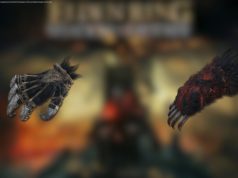« Rark! Halt your garbage vessel! » The captain of the hailing ship is an alien called a Drenkend who looks like one of those super-jacked kangaroos who has steroids for breakfast that has been surgically grafted on top of a Roomba. He’s aggressive and aggressively stupid, and his species has been ordered to kill all humans on sight. At the helm of humanity’s first interstellar starship, I
Need to know
What is it? An arcadey RPG reboot of a 90s space-war classic. Expect to pay: $40/£31 Reviewed on: Windows 10, i5 4690k, 16GB RAM, Nvidia GTX 970 Publisher: Stardock Entertainment Developer: Stardock Entertainment Link: Official site
« Rark! Halt your garbage vessel! » The captain of the hailing ship is an alien called a Drenkend who looks like one of those super-jacked kangaroos who has steroids for breakfast that has been surgically grafted on top of a Roomba. He’s aggressive and aggressively stupid, and his species has been ordered to kill all humans on sight.
At the helm of humanity’s first interstellar starship, I’m on a quest for friendly species who might help us in our fight with a galactic totalitarian. The Kangaroomba, on the other hand, just wants to start shit. Worse, every time I destroy one of these bozos, another one hails me and has the same conversation. It was pretty funny the first time. Now, not so much.
Moments after I destroy the Drenkend fleet, I receive an incoming hail: « Rark! Halt your garbage vessel! » It’s yet another Drenkend, and I absolutely want to just die of boredom.
Galactic grind
Exploring planets did occasionally make my framerate stutter and my landing craft explode for no reason, which was at least good for a laugh.
With an entire galaxy full of star systems and exoplanets to explore, it’s frankly unbelievable how shallow everything in Star Control: Origins feels. All of the same pieces of the 1992 MS-DOS classic, Star Control II, are still here: funny dialog, diplomacy, planetary exploration, space battles. But they come off as hollow imitations lost in the endless void of the grind.
For example, one of the most important jobs of my ship, the UES Vindicator, is gathering raw materials to bring home to Earth. The Vindicator is humanity’s only interstellar ship, and keeping it running or building a second ship is going to take up a lot of resources. Finding resources is easy: fly into orbit around a planet, launch a lander, and drive around the surface picking up floating blocks of iron, aluminum, gold, etc. There are a lot of different elements, but they all just go into the big Tank O’ Crap I sell back at Earth, so I didn’t care if I was picking up argon or oxygen. If I could have used the elements to craft upgrades for myself, that might be another matter, but the resources-and-trade system here just isn’t that deep.
Every planet is more or less the same—some are sort of gray or brown and some have trees and lakes—and the floaty, bouncy physics handling of the lander craft is an absolute horror. I get stuck on every little ridge and hilltop, and there’s no joy or challenge to driving around an empty planet to pick up Space Cash. Landing on planets involves a simple keep-within-the-lines mini game that only lasts for a few seconds and is equally joyless. Exploring planets did occasionally make my framerate stutter and my landing craft explode for no reason, which was at least good for a laugh.
I’d be more than happy to ignore resource-gathering entirely, but I quickly found that I couldn’t. Aside from exploring samey planets, there’s a whole galaxy full of species to talk to and far-flung destinations to reach. I set out into the stars, looking to seek out new life and new civilizations. Maybe I could even build a federation! But journeys are also a terrible slog, a murderous trial by attrition. Every encounter with a pirate or enemy vessel chipped away at my ship, and it’s impossible to repair or refit away from a space station. Winning fights wasn’t good enough—I had to win them flawlessly, because every piece of damage would still be there for the next fight, and the next.
More than once, I pounded and fought my way to a destination system only to arrive in tatters and with no possible way to make it to the actual planet and the aliens I had been sent to talk to. The only way to fix this was to start the journey again but with more upgrades on my ship and friendly ships recruited for my fleet—and that meant I had to head back to the landing craft to farm some resources. God, what a shame.
The grind is so heavy that anything that doesn’t feel like a grind feels out of place, as though the game is telling on itself a little bit. Holding the forward button to cross interstellar distances isn’t fun, so just turn on the auto-pilot and the ship flies itself. The landing-on-a-planet mini game isn’t fun, so a landing craft upgrade lets the lander fly itself. The combat can be really frustrating and repetitive, so an upgrade lets the ship fight battles itself. These options don’t really make the grind any better, but with good planning and a little care, you can almost avoid playing the game entirely.
Alien clones
The real jewel of Star Control: Origins is the writing. There’s snappy dialog everywhere, and each alien species is fantastically detailed and fleshed out as a distinct personality. The Tyvoom, for example, are sweaty worm nerds who are just desperate to have even one single friend. The Mu’Kay are adorable squids who exude joy and happiness (First contact with the Mu’Kay began, « Many playful splashes, unknown alien! »), but with a hard edge of self-delusional boredom. Any of these aliens and their jokes would fit in well with a Douglas Adams novel. They’re that good.
At least, they’re that good the first time. Again, the feeling of emptiness and shallowness seeped into my interactions with aliens. Everywhere I went, an alien would greet me identically, as if to say « Hello! Here are the seven jokes I can offer you. » It wasn’t long before I stopped hailing friendly ships to say hello, and I started ordering Fire At Will with enemy ships just to avoid having the same damn conversations again and again.
This is a real problem in a game that should theoretically be about diplomacy. I never got the feeling that I could offend an ally enough to turn them into an enemy or sweet-talk a pirate into letting me go without a fight. I was hoping for diplomacy tête-à-têtes like Picard, but what I got was like having an argument with the animatronics at Disney World.
The variety and depth of diplomatic options are, I think, where Star Control: Origins feels the absence of the original creators, Fred Ford and Paul Reiche, the strongest. It feels bizarre to say it, but that 1992 MS-DOS game was, first and foremost, a point-and-click adventure game where talking, wit, and character where the foundation of the entire project. Instead of talking and forging alliances, Origins pushes me to spend more of my time in repetitive grind-combat-grind cycles that don’t have the same joy.






